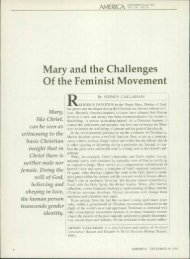Download PDF - America
Download PDF - America
Download PDF - America
Create successful ePaper yourself
Turn your PDF publications into a flip-book with our unique Google optimized e-Paper software.
to make materialism the foundation of his own understandingof evolution. But where Darwin felt uneasy splicingbiology onto such an inherently atheistic metaphysics, todaymany biologists and philosophers have no such hesitancy.Especially after it became possible in the last century tounderstand evolution in terms of genes migrating blindlyfrom one generation to the next, the irresistible temptationScientism and scientific naturalismframe every page of the newatheistic tirades. These wearyconstraints on human thoughthave been around for a long time.has arisen to resolve the entirety of life into a specialinstance of matter in motion.This reduction is the basis of Dawkins’s and Dennett’sunderstanding of evolution, and both Harris and Hitchensgo along with it. Dennett’s Breaking the Spell and Dawkins’sThe God Delusion assume that all living phenomena, includingour own ethical instincts and religious longings, can beadequately accounted for in an evolutionary and materialistmanner. Theological explanation, therefore, is now utterlysuperfluous.Scientism and the End of FaithThe materialist worldview espoused by the new atheists isitself the offspring of “scientism,” the widely sharedassumption that modern scientific method is the only wayfor reasonable, truth-seeking people to gain knowledge ofthe real world. Science, Harris insists, “has become the preeminentsphere for the demonstration of intellectual honesty.”Dawkins is even more emphatic: “It may be thathumanity will never reach the quietus of complete understanding,but if we do, I venture the confident predictionthat it will be science, not religion, that brings us there. Andif that sounds like scientism, so much the better for scientism.”For the new atheists science always trumps religiousbelief. Why? Because scientific method formulateshypotheses about phenomena on the basis of physicalobservations that can be tested over and over. Since religiousideas, by contrast, are not subject to publicly repeatableempirical verification (or falsification), rational inquiryrequires that they disown them.Religions, the new atheists complain, stem from “faith,”that is, from irrational acts of what they call “belief withoutevidence.” This is far from being a theologically informeddefinition, but it supports the new atheists’ declaration thatfaith is utterly opposed to science. “Pretending to knowthings you do not know is a great liability in science,” saysHarris, “and yet, it is the sine qua non of faith-based religion.”Hitchens adds, “If one must have faith in order tobelieve in something, then the likelihood of that somethinghaving any truth or value is considerablydiminished.”Since there is no scientifically accessible“evidence” to support the claims of religiousfaith, the authors classify them as “delusions.”According to Dawkins, the methods a goodtheologian should use “in the unlikely eventthat relevant evidence ever became available,would be purely and entirely scientific methods.”Science alone can decide the question ofGod.Scientism and scientific naturalism frameevery page of the new atheistic tirades. These weary constraintson human thought have been around for a long timeand still command a wide following in academic circles.What, then, is so new about the “new” atheism?Aside from the heavy dose of Darwinian materialism inDawkins’s and Dennett’s accounts of religion and morality(and even this is not peculiar to them), the only real noveltyadvanced by the four authors examined here is theirastounding intolerance of faith in any form. Since they takefaith to be the root cause of innumerable evils in the world,Dawkins, Harris and Hitchens instruct readers that it istime to erase every instance of “belief without evidence”from every human mind.Our critics warn that this ideal will never be actualizedas long as we keep nurturing the modern liberal tolerance offaith. In democratic societies most of us still assume uncriticallythat people have a right to believe whatever they want,but this leniency only makes the world ever more dangerous,the critics say. Most instances of faith may seem harmlessenough, but permissiveness toward any beliefs forwhich evidence is lacking opens an abyss in human mindsthat will inevitably be colonized sooner or later by the mostmonstrous religious lunacy. Events such as the terroristattacks of Sept. 11, 2001, should be proof enough that bytolerating faith to any degree, religious and secular liberalsalike become accomplices in evil.Theologians are especially to blame for making spacefor faith in people’s minds, according to the new atheists.That academic departments of theology still exist in an ageof science is, to them, a nauseating anachronism. “Surelythere must come a time,” Harris remarks, “when we willacknowledge the obvious: theology is now little more thana branch of human ignorance. Indeed, it is ignorance withMay 5, 2008 <strong>America</strong> 17









